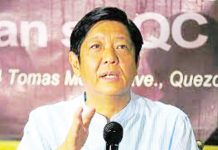
POLITICAL divisiveness often stalls progress, thus the completion of the monumental Jalaur River Multi-Purpose Project (JRMP) in Iloilo – which began its journey in the 1960s and has seen contributions from multiple administrations – is a rare but welcome showcase of continuity that is both commendable and exemplary.
Former Senate President Franklin Drilon lauded the sustained efforts of the Aquino and Marcos administrations in bringing the JRMP to fruition, underscoring a practical approach towards national development. The project, which includes a 109-meter high dam, a 38.5-meter afterbay dam, and an 80.74-kilometer high line canal, is a critical infrastructure initiative aimed at boosting agricultural productivity and ensuring food security in the region.
The continuity of JRMPI’s development — initiated under President Ferdinand Marcos Sr., significantly propelled forward during President Benigno Simeon “Noynoy” Aquino III’s term, and brought to completion under President Ferdinand “Bongbong” Marcos Jr. — shows that national interest can and should transcend political affiliations. President Aquino’s administration played a decisive role by securing a $207-million loan from the Korean Exim Bank, the largest Official Development Assistance project from South Korea to the Philippines, ensuring that the project had the necessary funding to move ahead.
The importance of such administrative continuity cannot be overstressed, especially when dealing with projects that span decades and multiple political administrations. Large-scale infrastructure projects like the JRMP are investments in the nation’s long-term stability and prosperity. By transcending political lines, leaders can ensure continuity in policy implementation, avoiding the common pitfalls of halted projects and wasted resources that often accompany political transitions.
The Jalaur mega dam project, expected to be fully operational by 2025, will provide year-round irrigation to approximately 31,840 hectares of farmland and significantly increase rice production. It demonstrates that sustained political will and cooperation can result in tangible benefits for the populace, particularly for the 25,000 farmers who will directly benefit from the project.
Current and future leaders must remember the lessons from the JRMP. True progress depends on a sustained and collective effort that bridges the gaps between differing political ideologies and administrations. It is this continuity that allows for the successful completion of projects that are crucial for stability and growth.
National development needs continuity, cooperation, and a commitment to the common good that rises above the fray of political rivalry.







